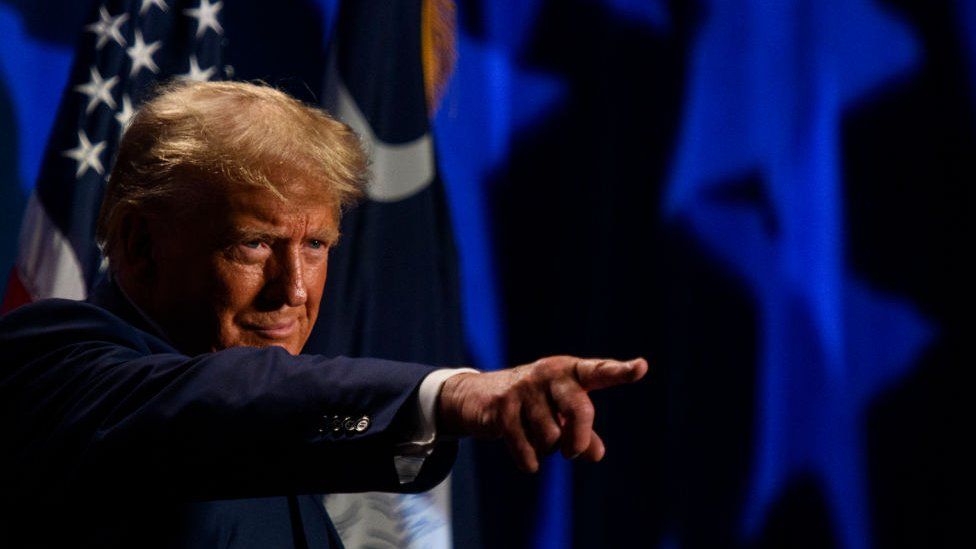ARTICLE AD BOX
 Image source, Getty Images
Image source, Getty Images
Donald Trump has said his lawyers will seek a venue change and new judge in his election fraud case.
By Bernd Debusmann Jr
BBC News, Washington
A federal judge has warned former US President Donald Trump against making "inflammatory" statements which could taint the jury pool ahead of his trial for conspiring to overturn the result of the 2020 election.
But Judge Tanya Chuktan ruled that Mr Trump can publicly share some of the non-sensitive evidence which prosecutors disclose to his legal team.
Friday's ruling was a blow to the special counsel who had expressed concern Mr Trump might reveal secret material and intimidate witnesses.
At a 90-minute hearing in Washington DC, the judge said the historic case was proceeding as normal.
"He is a criminal defendant. He is going to have restrictions like every single other defendant," she said.
"The fact that the defendant is engaged in a political campaign is not going to allow him any greater or lesser latitude than any defendant in a criminal case."
What Mr Trump can reveal publicly is one of several battles being fought between the former president's legal team and federal prosecutors.
What is a protective order?
Requests for protective orders are fairly routine in criminal cases. In many cases, defence teams are reluctant to oppose the orders because doing so would slow down "discovery" - the process in which prosecutors hand over evidence.
In this case, however, Mr Trump and his lawyers argued that his free speech was being stifled and argued that only sensitive information should be kept under wraps.
Judge Chutkan agreed. However, she said that his First Amendment rights was "not absolute" amid the ongoing case - and warned that she would not allow a "carnival atmosphere" at his eventual trial.
The former president is already subject to a protective order in a separate upcoming New York case about alleged hush money payments to former adult film actress Stormy Daniels.
His legal team also agreed to similar conditions in another case related to his alleged mishandling of classified documents.
"The thing that's different about the Florida case is that the documents themselves are confidential," said Kevin McMunigal, a former federal prosecutor and law professor at Case Western Reserve University.
"And there, a lot of the witnesses are going to be FBI agents who went in and seized the documents. They aren't going to be intimidated."
Can the trial's venue be changed?
The protective order is far from the only point of contention for Mr Trump in his Washington DC case. He has also argued that he cannot expect a fair trial in the US capital because the city's electorate votes overwhelmingly for Democratic candidates.
His lawyer, John Lauro, has suggested nearby West Virginia as an alternative.
Any venue change, however, is extremely unlikely.
More than three dozen participants in the 6 January, 2021, riot at the US Capitol have already sought to have their trials moved out of the city, only to be rejected - sometimes by Trump-appointed judges.
In a July filing, prosecutors argued "the fact that most [DC] residents voted against Donald Trump does not mean those residents could not impartially consider the evidence" in the case.
The fact the courts in DC have handled a lot of cases related to the riot creates "a lot of precedent" that would work against Mr Trump's request to change venues, said Mr Tobias.
"Many other judges on the same court have already said that [DC] is large and diverse enough that the presumption that you can't sit 12 impartial jurors is far-fetched," he added.
Image source, Getty Images
Image caption,Donald Trump believes he is unlikely to get a fair trial in Democrat-leaning Washington DC
Should Judge Tanya Chutkan recuse herself?
Following Mr Trump's initial arraignment on 3 August in the election fraud case , he also took aim at Judge Chutkan, arguing that "there is no way" that he can get a fair trial with her assigned to the case.
He vowed that his legal team would ask that Ms Chutkan recuse herself on what he termed "very powerful grounds". They have yet to do so.
The 61-year-old judge has earned a reputation for strictly punishing defendants accused of participating in the Capitol riot.
Mr Tobias explained that in the US federal court systems, judges can and should be recused if they have a conflict of interest or "an appearance of unfairness" that would hinder their ability to oversee a case.
"But [Judge Chutkan] has given no indication of that," he said.
"I think she will stay on the case," he added. "[Trump] won't win on that point."

 1 year ago
36
1 year ago
36








 English (US) ·
English (US) ·